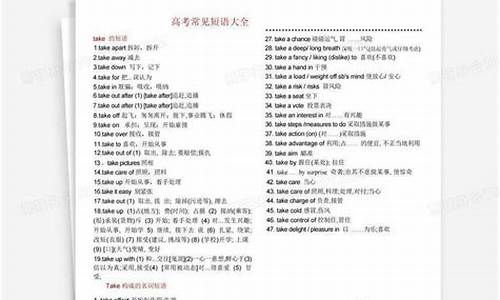您现在的位置是: 首页 > 教育资讯 教育资讯
高考的动词短语有哪些-高考的动词短语
tamoadmin 2024-09-12 人已围观
简介1.高考英语出现频率最高的词组2.帮助找找有那些可接双宾语的词 同义句中介词用for还是to3.高考英语高频词组大全4.come相关的高考英语短语高考英语出现频率最高的词组50个最新高考英语必备的高频词组 1.abide by(=be faithful to ; obey)忠于;遵守。2. be absent from…. 缺席,不在3. absence or mind(=being absen
1.高考英语出现频率最高的词组
2.帮助找找有那些可接双宾语的词 同义句中介词用for还是to
3.高考英语高频词组大全
4.come相关的高考英语短语
高考英语出现频率最高的词组

50个最新高考英语必备的高频词组
1.abide by(=be faithful to ; obey)忠于;遵守。
2. be absent from…. 缺席,不在
3. absence or mind(=being absent-minded) 心不在焉
4. absorb(=take up the attention of)吸引…的注意力(被动语态):be absorbed in 全神贯注于…近:be engrossed in ; be lost in ; be rapt in ;be concentrated on ; be focused on ; be centered on
5. (be) abundant in(be rich in; be well supplied with) 富于,富有
6. access(to) (不可数名词) 能接近,进入,了解
7. by accident(=by chance, accidentally)偶然地,意外. Without accident(=safely) 安全地,
8. of one’s own accord(=without being asked; willingly; freely)自愿地 ,主动地
9. in accord with 与…一致 . out of one’s accord with 同….不一致
10. with one accord (=with everybody agreeing)一致地
11. in accordance with (=in agreement with) 依照,根据
12. on one’s own account 1) 为了某人的缘故, 为了某人自己的利益 2)(=at one’s own risk) 自行负责 3)(=by oneself)依靠自己 on account 赊账; on account of 因为; on no account不论什么原因也不;of …account 有…..重要性.
13. take…into account(=consider)把...考虑进去
14. give sb. an account of 说明, 解释 (理由)
15. account for (=give an explanation or reason for) 解释, 说明.
16. on account of (=because of) 由于,因为.
17. on no account(=in no case, for no reason)绝不要,无论如何不要(放句首时句子要倒装)
18. accuse…of…(=charge…with; blame sb. for sth. ; blame sth. on sb. ; complain about) 指控,控告
19. be accustomed to (=be in the habit of, be used to)习惯于.
20. be acquainted with(=to have knowledge of) 了解; (=to have met socially) 熟悉
21. act on 奉行,按照…行动; act as 扮演; act for 代理
22. adapt oneself to(=adjust oneself to) 使自己适应于
23. adapt…(for) (=make sth. Suitable for a new need) 改编, 改写(以适应新的需要)
24. in addition (=besides) 此外, 又, 加之
25. in addition to(=as well as, besides, other than)除…外
高考常用动词短语搭配
1.动词+about
speak/talk about谈论
think about思考
care about关心,对...有兴趣
bring about引起,使发生
set about 着手,开始
come about发生
hear about听说
worry about为...担心
2.动词+away
throw away 扔掉
blow away吹走
carry away拿走,使入迷
clear away清除掉,消散
die away逐渐消失
pass away 去世
wash away冲走
take away拿走
put away收拾起来,存起来
give away背弃,泄露
wear away磨掉,消耗
break away摆脱
send away让走开
turn away把...打发走
3.动词+back
keep back隐瞒,忍住
hold back控制住
call back回电话
look back回顾
give back归还
take back拿回,收回
4.动词+for
run for竞选
ask for要求得到
wait for等候
long for渴望
care for关心,喜欢
search for查找
call for要求,需要
change for用...换
apply for申请
seek for寻找
stand for代表,表示
hope/wish for希望得到
beg for乞求
look for寻找
hunt for寻找
charge for收费,要价
take for误以为...是
come for来拿,来取
5.动词+down
burn down 烧毁
take down记下,记录
cut down削减,砍倒
pass down 传下来
calm down平静下来
settle down 安家
tear down 拆毁,拆除
break down坏了,垮了,分解
turn down调小,拒绝
slow down慢下来
put down记下,写下,镇压
bring down使...降低,使倒下
come down下落,传下
6.动词+at
come at 向...袭击
run at冲向,向...攻击
tear at用力撕
stare at凝视
glance at匆匆一瞥
knock at敲门,窗等
smile at冲某人笑
aim at向...瞄准
wonder at惊讶
shout at冲某人嚷嚷
work at干...活动研究
look at看,注视
glare at怒视
laugh at嘲笑
point at指向
strike at向...打击
shoot at向...射击
call at拜访地点
7.动词+from
differ from与...不同
suffer from受...苦
hear from收到...来信
die from因...而死
keep/stop/prevent from不让...做
learn from向...学习
date from始于...时候
result from由于
separate from把...分离开
8.动词+of
think of想到
consist of由...组成
approve of赞成
talk of谈到
complain of抱怨
dream of梦到
speak of 读到
die of死于
hear of听说
become of发生...情况,怎么啦
9.动词+off
start off出发
set off出发
leave off''中断
show off炫耀
get off下车
see off送行
put off延期,推迟
cut off切断,断绝
keep off避开,勿走近
knock off把...撞落
pay off还清
get off脱下衣服等
trun/switch off关掉
take off脱下,起飞
ring off挂断电话
come off脱掉,褪色
fall off跌落,掉下
go off走开,消失,坏了
break off打断
carry off携走,带走
give off散发出
10.动词+on
depend on依靠
insist on坚持
keep/go on继续
put on穿上,戴上,上演
move on 继续移动,往前走
feed on以...为生
take on 雇佣,呈现
have on穿着
look on 旁观
rely on依靠
carry on继续,进行
spend on在...花钱
call on拜访
live on以...为生
bring on使...发展
try on试穿
pass on传授,传递
turn/switch on打开
11.动词+out
break out爆发
point out指出
pick out选出
burst out迸发
carry out 执行
hold out坚持下去
figure out 算出
bring out 阐明,使表现出
help out救助
set out出发,着手
wear out穿破,使...疲劳
make out 理解,看清楚
cross out划掉
keep out of使不进入,挡住
find out查出,弄明白
try out 试用,试验
put out 扑灭
hand out 散发
2 高考常用动词短语搭配
run out用完
let out泄露,发出声音
turn out 结果是,生产
come out出版,出来
leave out省略,删掉
work out算出,想出办法等
give out散发,分发,用完
look out当心,堤防
speak out大胆讲出
send out发出,派遣
go out 熄灭 12.动词+in
give in让步
bring in引进,使得到收入
result in导致
join in参加
get in收获,进入
fill in填写
cut in插入
look in来访,参观
hand in上交
drop in拜访
succeed in在...获得成功
take in接纳,吸收
break in强制进入,插话
call in召集,来访
persist in坚持
13.动词+into
look into研究,调查
burst into闯入,迸发
change into把...变成
run into碰到
turn into变成
divide into把...分成
put/translate into把...译成
14.动词+over
turn over翻倒,细想
go over审阅,检查,研究
get over克服
take over接管,接替
fall over跌倒,摔倒
think over仔细考虑
look over翻阅,检查
run over压死,看一遍
watch over看守,照看
roll over翻滚
15.动词+to
belong to属于
refer to谈到,涉及,参阅
turn to向...求助,查阅
see to处理,料理
reply to答复
object to反对
point to指向
stick/hold/keep to坚持,忠于
come to 共计,苏醒
get to到达
bring to使苏醒
agree to同意
supply to为...提供
add to增添
devote to贡献给
compare to与...相比,把...比作
write to写信给
lead to导致,通向
attend to处理
16.动词+up
grow up 成长,长大
build up建立
put up 搭起,架起,安装,住宿,张贴,盖起
do up整理,包装,打扮
get up起床,站起
bring up抚养,呕吐,提出
stay up挺住,熬夜
sit up熬夜
use up用完
lay up积蓄
cut up切碎
end up总结
speed up加快速度
clear up整理,收拾,放晴
burn up烧毁
hurry up赶快
keep up保持
send up发射
open up开创,开辟
break up分解
give up放弃,献出
set up架起,建立
go up增长,上涨
pick up拾起,学会,用车,来接,收听到
turn up开大,出席,出现
take up开始学,从事,占据
eat up吃完
tear up撕碎
make up构成,组成
join up联结起来,参军
come up上来,长出,出现
throw up呕吐
look up查找,找出
catch up赶上
fix up修理,安排,装置
hold up耽搁,使停顿
ring up打电话
divide up分配
17.动词+through
get through通过,干完,接通电话
go through审阅,检查,学习
see through识破
pull through渡过危机,康复
look through 翻阅,看一遍,仔细查看
put through接通电话
check through核对
18.动词+with
deal with处理,对付
meet with遇到,遭受
agree with同意,与...一致
combine with与...相联合
do with处理,需要
talk with同...交流
compare with与...相比
equip with以...装备
cover with用...覆盖
end with以...结束
provide with 以...供给
begin with以...开始
supply with以...供给
play with 玩,玩弄
19.三词以上的短语动词
add up to总计
keep away fro避开,别靠近m
look down on 轻视
put up with忍受
keep up with 赶上
make up for弥补
get on/along with和...相处
get close to接近
get out of逃避,避免
set fire to放火烧
take notice of注意
do well in在...干得好
take a photo of拍...照片
make fun of开玩笑,取笑
get used to习惯于
keep in touch with保持联系
come into being出现
take pride in为...而自豪
take an interest in对...感兴趣
make a fool of愚弄
take charge of负责
make friends with同...交朋友
take part in参加
catch sight of看见
break away from摆脱
do away with废除
look up to仰望,尊敬
catch up with 赶上
run out of用完
go on with继续
look forward to盼望
take hold of握住
get down to认真开始
pay attention to注意
set an example to为...树立榜样
pay a visit to访问
take the place of取代
make use of利用
get into the habit of染上...的习惯
get rid of摆脱
keep an eye on堤防
take care of照看
help oneself to随便吃,用
make room for给...让地方
take advantage of利用
take pity on可怜
play a part in 起作用,扮演...的角色
lose sight of看不见
帮助找找有那些可接双宾语的词 同义句中介词用for还是to
这些足够了吧?
50个可接双宾语的高考高频动词
(一) 双宾语易位时需借助介词to的常用动词
award sb. sth. = award sth. to sb. 颁奖给某人
bring sb. sth. = bring sth. to sb. 把某物带给某人
hand sb. sth. =hand sth. to sb. 把某物递给某人
lend sb. sth. = lend sth. to sb. 把某物借给某人
mail sb. sth. = mail sth. to sb. 把某物寄给某人
offer sb. sth. = offer sth. to sb. 将某物给某人
owe sb. sth. = owe sth. to sb. 欠某人某物
pass sb. sth. = pass sth. to sb. 把某物递给某人
pay sb. sth. = pay sth. to sb. 付给某人某物(钱)
post sb. sth. = post sth. to sb. 把某物寄给某人
read sb. sth. = read sth. to sb. 把某物读给某人听
return sb.sth. = return sth. to sb. 把某物还给某人
send sb. sth. = send sth. to sb. 把某物送给某人
sell sb. sth. = sell sth. to sb. 把某物卖给某人
serve sb. sth. = serve sth. to sb. 拿某物招待某人
show sb. sth. = show sth. to sb. 拿某物给某人看
take sb. sth. = take sth. to sb. 把某物拿给某人
teach sb. sth. = teach sth. to sb. 教某人某物
tell sb. sth. = tell sth. to sb. 告诉某人某情况
throw sb. sth. = throw sth. to sb. 把某物扔给某人
write sb. sth. = write sth. to sb. 给某人写信
(二) 双宾语易位时需借助介词for的常用动词
book sb. sth. = book sth. for sb. 为某人预定某物
buy sb. sth. = buy sth. for sb. 为某人买某物
choose sb. sth. = choose sth. for sb. 为某人选某物
cook sb. sth. = cook sth. for sb. 为某人煮某物
draw sb. sth. = draw sth. for sb. 为某人画某物
fetch sb. sth. = fetch sth. for sb. 为某人去取某物
find sb. sth. = find sth. for sb. 为某人找到某物
fix sb. sth. = fix sth. for sb. 为某人准备某物
get sb. sth. = get sth. for sb. 为某人拿来某物
make sb. sth. = make sth. for sb. 为某人做某物
order sb. sth. = order sth. for sb. 为某人订购某物
pick sb. sth. = pick sth. for sb. 为某人采摘某物
prepare sb. sth. = prepare sth. for sb. 为某人准备某物
save sb. sth. = save sth. for sb. 为某人留某物
sing sb. sth. = sing sth. for sb. 为某人唱某物(歌)
spare sb. sth. = spare sth. for sb. 为某人让出某物
steal sb. sth. = steal sth. for sb. 为某人偷某物
(三)有的动词后接的双宾语易位时,既可用介词to引出间接宾语,也可用介词for引出间接宾语,含义相同。如bring,play等:
1. Bring me today’s paper.
= Bring today’s paper to [for] me. 把今天的报纸拿给我。
2. He played us the record he had just bought.
= He played the record he had just bought for [to] us. 他放了他刚买的唱片给我们听。
(四)有的动词后接的双宾语易位时,即可用介词to引出间接宾语,也可用介词for引出间接宾语,含义不同。如leave等:
1. They left me no food.
= They left no food for me.他们没给我留一点食物。
2. My uncle left me a large fortune.
= My uncle left a large fortune to me. 叔叔死后留下一大笔财产给我。
(五)而有的动词后接双宾语时,既不能用介词to引出间接宾语,也不能用介词for引出间接宾语。如allow, ask, cause, charge, cost, forgive, refuse等:
He allows his son too much money.他给他儿子的钱太多。
He asked me some questions. 他问了我一些问题。
This caused me much trouble. 这给我带来了许多麻烦。
He charged me five dollars for a cup of tea.他一杯茶向我要了5美元。
His mistake cost him his job. 他的错误让他丢了工作。
I envy you your good luck. 我羡慕你的好运。
They forgave him his rudeness. 他们原谅了他的鲁莽。
He refused her nothing. 她要什么他就给什么。
高考英语高频词组大全
高考英语高频词组大全
1.able 用法:be able to do
Note: 反义词unable表示不能,而disabled表示残疾的。
be able to do可以表示经过艰难困苦才能做到的事。
2.abroad 用法:表示到(在)国外,是一个副词,前面不加介词。
Note: 可以说from abroad, 表示从国外回来。
3.admit 用法:表示承认的时候后面要加上动名词形式。
Note: 表示允许进入的时候与介词to搭配。
4.advise 用法:advise sb. to do; advise doing
Note: 后面的.宾语从句要用虚拟语气。即:advise that sb. (should) do的形式。
5.afford 用法:通常与动词不定式搭配使用。
Note: 前面需要有be able to或can等词。
6.after 用法:表示在时间、空间之后;be after表示追寻。
Note: 用在将来时的时候后面接一时间点,而in接一个时间段,如:after 3 o’clock; in 3 days.
7.agree 用法:与介词on, to, with及动词不定式搭配。
Note: agree on表示达成一致;agree to表示批准;agree with表示同意某人说的话。
agree vi.同意;持相同意见 I cannot agree with you on this point.在这一点上,我不能同意你的意见。
sb. agree with sb 同意某人的话,意见
sth. agree with sb 某物,某事适应某人
agree to sb 建议
agree on sth 在某一点上取得一致意见
agree up sth 在某一点上取得一致意见
agree to do sth 同意干某事
8.alive 用法:表语性形容词,在句中只能作表语,不能作定语。
Note: 可以作状语使用,表示活活地,如:bury sb. alive.
9.allow 用法:allow doing; allow sb. to do
Note: 可以表示允许进入,如:Please allow me in.
10.among 用法:用在三者或三者以上的群体中。
Note: 还可以表示其中之一,如:He is among the best.
11.and 用法:用于连接两个词、短语、句子或其他相同结构。
Note: 与祈使句搭配时往往可以表示条件。如:Work hard, and you’ll succeed sooner or later.
12.another 用法:表示又一个,泛指,相当于one more的含义。
Note: 不能直接加复数名词,需要与一个数词搭配,如:another 2 weeks.
13.answer 用法:及物动词,但在作名词时要与介词to搭配。
Note: 可以表示接电话、应门等。如:answer the phone/door.
14.anxious 用法:be anxious for/about/to do
Note: be anxious about表示担心;be anxious for表示盼望得到。
15.appear 用法:不及物动词,没有宾语,没有被动语态。
Note: 还可以作为系动词,与seem同义,表示看起来……。
16.arrive 用法:arrive at表示到一个小地方;arrive in表示到一个大地方。
Note: 引申含义表示得出,如:arrive at a decision/conclusion.
17.ask 用法:ask to do; ask sb. to do; ask for
Note: 后面的宾语从句要用虚拟语气。即:ask that sb. (should) do的形式。
18.asleep 用法:表语性形容词,在句中只能作表语,不能作定语。
Note: 通常与动词be及fall搭配;sound asleep表示熟睡。
19.attend 用法:表示参加,后面经常加上meeting, lecture, conference, class, school, wedding, funeral等词;也可以表示照顾,照料。
Note: attend to可以表示处理、照料等。
20.attention 用法:pay attention to; draw/catch sb’s attention
Note: 写通知时的常用语:May I have your attention, please?
come相关的高考英语短语
高中阶段有关come的短语:
1、come true?实现,成真;成为现实
2、come from?来自;出生于
3、come back?回来;记起;恢复原状,重新流行
4、come out?出现;出版;结果是
5、come into?进入;得到
6、come on?v. 快点;开始;要求;上演;跟着来;突然产生
7、come up?走近;发生;开始;上升;发芽;被提出
8、come in?进来;到达;流行起来
9、come here?来这里
10、come up with?提出;想出;赶上
11、come with?与……一起供给;伴随……发生;从……开始
12、come down?下来,降落;流传下来;倒塌;落泊,失势
13、come near?走进;险些;可与…相比(多用于否定句)
14、come and go?来来往往,来来去去
15、come for?为某种目的而来取;向…冲来;对…进行袭击
16、come together?vi. 集合
17、come over?过来;顺便来访;抓住
18、come across?v. 偶遇;无意中发现;讲得清楚明白;[口]给人…印象
19、come to school?上学
20、come out of?v. 由...产生;从...出来
扩展资料
come的用法
1、come的基本意思是“朝某中心点接近、到达某地点或达到某种状态”。
2、come可以表示“来临,降临”,常用以指时间或事件按规律或自然法则等“顺理成章”地到来,也可指和他人在一起来参加某活动。
3、“come+静态动词的不定式”构成复合谓语,可表示一种情况变化的过程,如由“不知”到“知之”,由“不清楚”到“清楚”,由“不理解”到“理解”,即给静态动词一个起点,而使其具有动态意义,且具有“终于”的意味。
4、现在分词与come连用,可表示伴随动作〔状态〕,指某人或某事物按某种方式行进或某人在行进中做某事,也可表示目的。
5、come在祈使句中一般不接动词不定式表示目的,而多用“come?and to/ - v ”结构,在美式英语中,尤其是口语中and常可省略。
6、come可以用作系动词,接形容词作表语,意思是“变得,成为”,常常指好的事情。
7、come除在成语或谚语中外一般不用于被动结构,但其过去分词可和be连用构成系表结构。
8、come的进行时可表示按计划或安排即将发生的动作,这时一般有表示将来的时态或特定的上下文。若表示过去将来的情况须用was/were coming,但come通常不用be going to结构。
9、come是非延续性动词,不与表示一段时间的状语连用。









